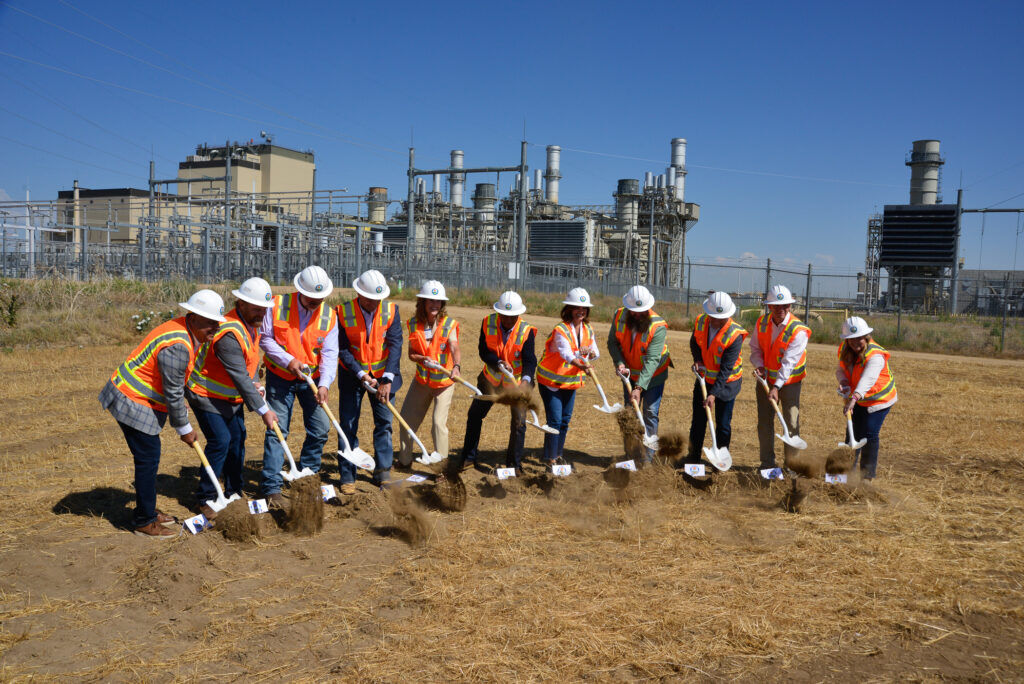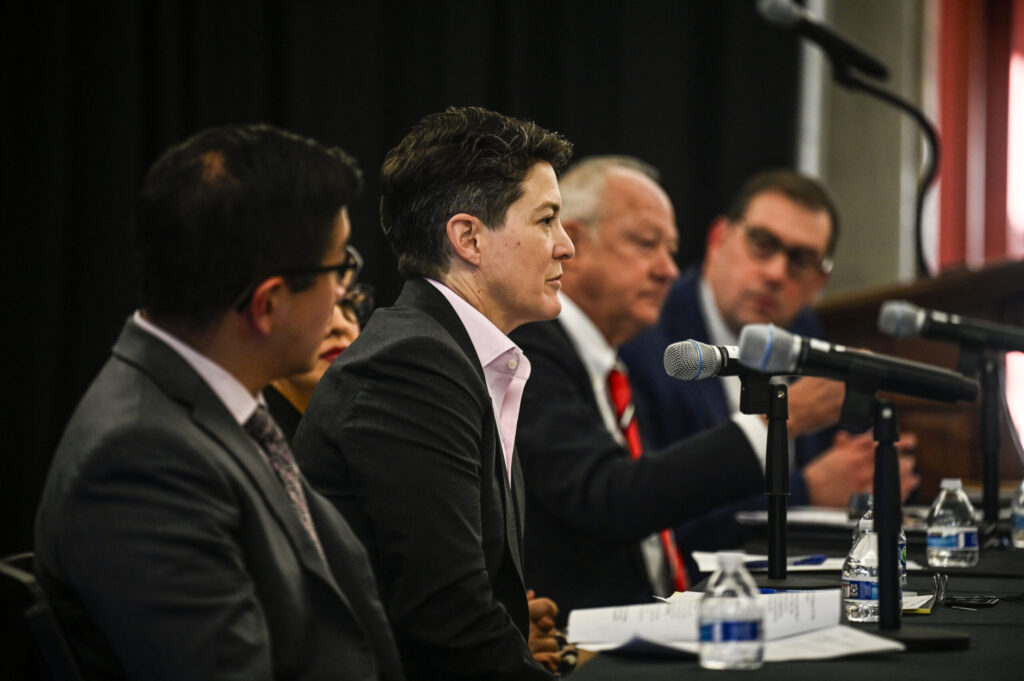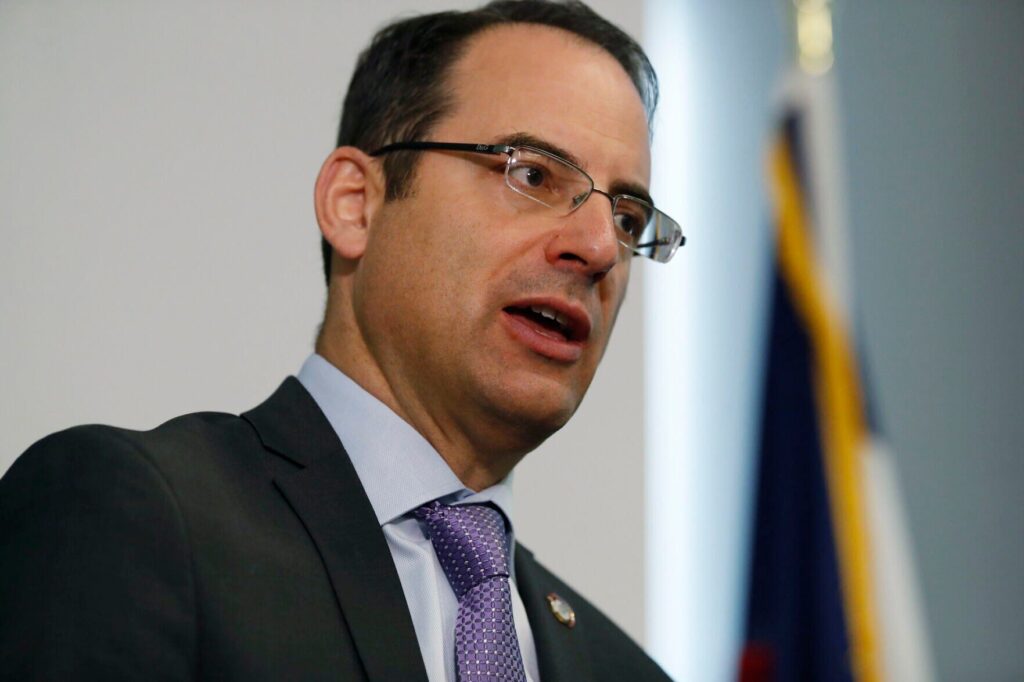Where do Denver’s mayoral candidates stand on pressing energy challenges?

We asked Denver’s candidates for mayor their position on the city’s most challenges energy issues.
Below are their responses, which have been edited for brevity and clarity. Not all candidates responded.
Denverites saw their utility bills double or even triple this winter. What three steps you would take as mayor to curb soaring energy bills in Denver?
Renate Behrens:
Help customers financially. Remind utility providers of their responsibility to the people and do not give them taxpayers’ money. Socialize/nationalize the providers because these things a basic human rights/constitutional rights. Give the people what they deserve/need.
Kelly Brough:
Expand consumer assistance programs. Partner with the Public Utilities Commission and the state to encourage policies that reduce or limit spikes in consumer costs. Support incentive programs to help homeowners increase efficiency of their homes.
Mike Johnston:
Skyrocketing rates for energy over the last few months have put too many Denverites in a position where they have to decide whether to pay for groceries or pay for heat, even as Xcel reports massive profits. I will seek to renegotiate a contract that incentivizes energy companies to keep rates as low as possible when the prices of resources like natural gas rise. I will also negotiate to have more transparency in how Xcel determines their rates for the city and offer programs to help residents pay for their utility bills in a fair and equitable way. This also underscores why we need to electrify Denver so we can move more of our energy supply onto renewable sources like wind and solar that do not put us at risk for the price spikes of natural gas.
Trinidad Rodriguez:
Because energy prices are inherently volatile and outside of Xcel’s control, I will push Xcel to stabilize electricity and gas rates at the PUC. This can be accomplished by requiring Xcel to maintain rate stabilization reserves and/or using hedging and other financing arrangements to protect from these curbs. I will also make this a point of negotiation with Xcel regarding their concession agreement. As a regulated investor-owned monopoly, I will work to ensure that Xcel increases its commitment to the community as a key stakeholder in their success.
Terrance Roberts:
The best way as mayor I can help is by making sure that Xcel Energy is in compliance with properties as much as the mayor can. Xcel to me is a monopoly, but they are their own entity. I would go as far as looking to take steps to municipalize Xcel if it’s possible. High energy cost is the main reason behind poverty after housing cost and rising food cost. The city will have a fund created by a Public Banking System, built into our Public Safety Budget. The fund will give energy cost support to families in need as part of our public safety plan. It’s literally a public safety factor in preventing poverty. Xcel Energy has a low-income support plan already, yet it’s continuing to raise rates, canceling out their own savings.
Ean Tafoya:
There’s so much we can do on this issue, but here’s just three steps. First, we need a strong advocate in our rate cases with Xcel, who will push to lower bills especially for low-income customers. This should be feasible given Xcel’s $1.74 billion 2022 profits. We should also research the feasibility of a municipal utility in Denver. Second, we need to help communities access energy sovereignty, increasing access to solar not only for individual homeowners but for those who rent, like myself. We do that at the neighborhood level by helping communities purchase or subscribe to community solar gardens, which lower bills and increase resiliency. Finally, we need to retrofit old buildings and construct new buildings with energy efficiency and sustainability standards that will lower energy bills for residents.
Programs are available to help low-income residents upgrade the energy efficiency of their homes. How would you help residents who don’t qualify because they earn just above the income cutoff?
Renate Behrens:
I would include them in the programs they do not qualify for with lottery, etc., money, and of course educate them about this topic.
Kelly Brough:
The “cliff effect” is real in many public programs. I support sliding scale approaches that offer government support relative to income – meaning that the lowest income families receive the highest level of support, but rather than having a hard income eligibility threshold, public support is taper down as income increases.
Mike Johnston:
As mayor, I would prioritize supporting all families who want to provide energy efficiency improvements to their homes by working to provide financing to support these energy efficiency improvements that can be paid off by the savings that come when they pay lower energy bills. This is great job creation for folks doing energy efficiency improvements, helps reduce climate impact, and saves families money. We will also work to expand the pipeline of people who are trained to enter these jobs that will be required to retrofit buildings and residences across the city.
Terrance Roberts:
As a property inspector, I understand that a lot of fuel cost and greenhouse gas emissions comes from filling water heater tanks and gas appliances for heating. New builds should start with tankless water heaters and energy efficient doors and windows. For properties needing these upgrades, the city will benefit by helping to have these upgrades happen.
Trinidad Rodriguez:
I’m interested in providing support for households that nearly qualify for energy efficiency improvements. In this situation, using our financing capability, we may be able to finance the improvements’ cost for homeowners to spread the expense over time and leading to a net positive cash flow for them throughout the program.
Ean Tafoya:
We need to increase public education in multiple languages because a lot of people don’t know how to apply to these programs or the applications themselves are huge barriers. We can use state and local funding, as well as public banking, to help those who make just above the cutoff but can’t upgrade their homes on their own.
It’s now 2023 and Denver is striving for a 40% reduction in greenhouse gas emissions from a 2019 baseline by next year, a 65% reduction by 2030 and eliminating 100% of greenhouse gas emissions by 2040. If you agree with these goals, what would you do to achieve them? If you don’t agree with these goals, please elaborate why.
Renate Behrens:
I agree. My first and biggest part is to improve public transportation – electric only – according to the needs and wants of the riders. It will be totally free, will keep some hundreds of dollars in the riders’ pockets, if they leave their cars out of Denver. Stronger: only let electric cars into Denver.
Kelly Brough:
I fully endorse and embrace Denver’s greenhouse gas emissions reduction goals. While I view them as ambitious, I believe that with dedicated leadership and cross-sector and regional collaboration, they are achievable. As mayor, will do everything in my power to reach them. My specific priorities on climate action will include: Fostering partnerships, particularly with RTD, DPS and DRCOG, to increase efficiency and reduce emissions from our publicly owned fleets and promoting regional action on air and water quality.
-
Promoting higher efficiency housing density, particularly along major transportation corridors and at transit sites, and supporting the conversion of under-utilized and vacant office space to housing.
-
Aggressively building electrification infrastructure on city-owned properties. This could include installing solar arrays and / or electric vehicle charging stations at city-owned locations across Denver including libraries, recreation centers, fire and police stations.
-
Supporting the education, training, and re-skilling necessary to ensure Denver residents, particularly people of color, are prepared and well positioned to capitalize on good-paying clean energy and green economy sector jobs. For example, I could envision building a partnership between the city, Xcel, Denver Public Schools, and our local higher education institutions to educate and train the electricians and electrical engineers we need to meet future demand.
-
Ensuring we are using our dedicated funding stream for Parks and Recreation to equitably expand access to parks and open spaces and investing in the tree canopy across the city.
Mike Johnston:
I am committed to transforming the city into a national leader in clean energy and climate sustainability by committing to have 100% of Denver’s electricity sourced from renewable sources by 2040. This requires electrifying our fleet and our buildings while reducing vehicle emissions by providing incentives to increase the use of public transit, increase ridership, and increase route frequency and ride quality. Whether it’s through building community solar gardens or building affordable housing in Denver so the people that work here can live here and stop commuting 20, 30, 40 miles to work, the city should take action to support individual Denverites who want to live more sustainably. We must also take a more aggressive approach to preserving water by incentivizing turf and xeriscaping wherever possible.
Terrance Roberts:
I do agree. As stated, we need new builds with energy efficient doors and windows, and less to no gas usage appliances. We need to get as many cars off of the streets as possible by democratizing modes of transportation around our city for more walkers, bikers, rollers.
Trinidad Rodriguez:
It appears that Denver achieved a 23% reduction in GHG in 2021 from 2019 levels. I will continue the implementation of Denver’s robust Climate Action Plan. This may not be enough. That is why I will aggressively pursue self-driving technology when, in combination with electric or hybrid mass transit vehicles, has the potential to reduce emissions per vehicle mile traveled and improve the transit service frequency and coverage. As mayor, I will position Denver to specifically attract this innovation industry as a long-term play in our future development. I believe we can channel markets through setting public/private investment targets, coordinating with cities that have similar climate approaches as a purchaser, investor, and partner. Finally, unlocking the potential for Denver to grow much more of its own healthy produce is critically important to reducing GHG. Having researched urban agriculture for nine months, including growing in a community supported agriculture farm, I’ve seen that it can be an opportunity for so many more in our community to begin to offset the negative impacts food industries have on our climate and health while achieving greater equitable food access.
Ean Tafoya:
These goals are not ambitious enough. Climate change is a huge crisis, but it’s also a huge opportunity to remake our society in a greener, cleaner, and more equitable way. This is my life’s work. It’s about power to the people – literally! First, we need to create good local jobs ensuring our existing buildings are energy efficient and sustainable, while ensuring all new development meets sustainability and efficiency requirements. Then, we need to develop sustainably in general: increasing and electrifying public transportation and building out walkable and bikeable neighborhoods to decrease the need for cars. This includes increasing local food production, making Denver less dependent on global supply chains, reducing emissions, and creating jobs. Most importantly we have to hold polluters accountable and move away from harmful industries by increasing renewable energy in Denver and regionally.
















